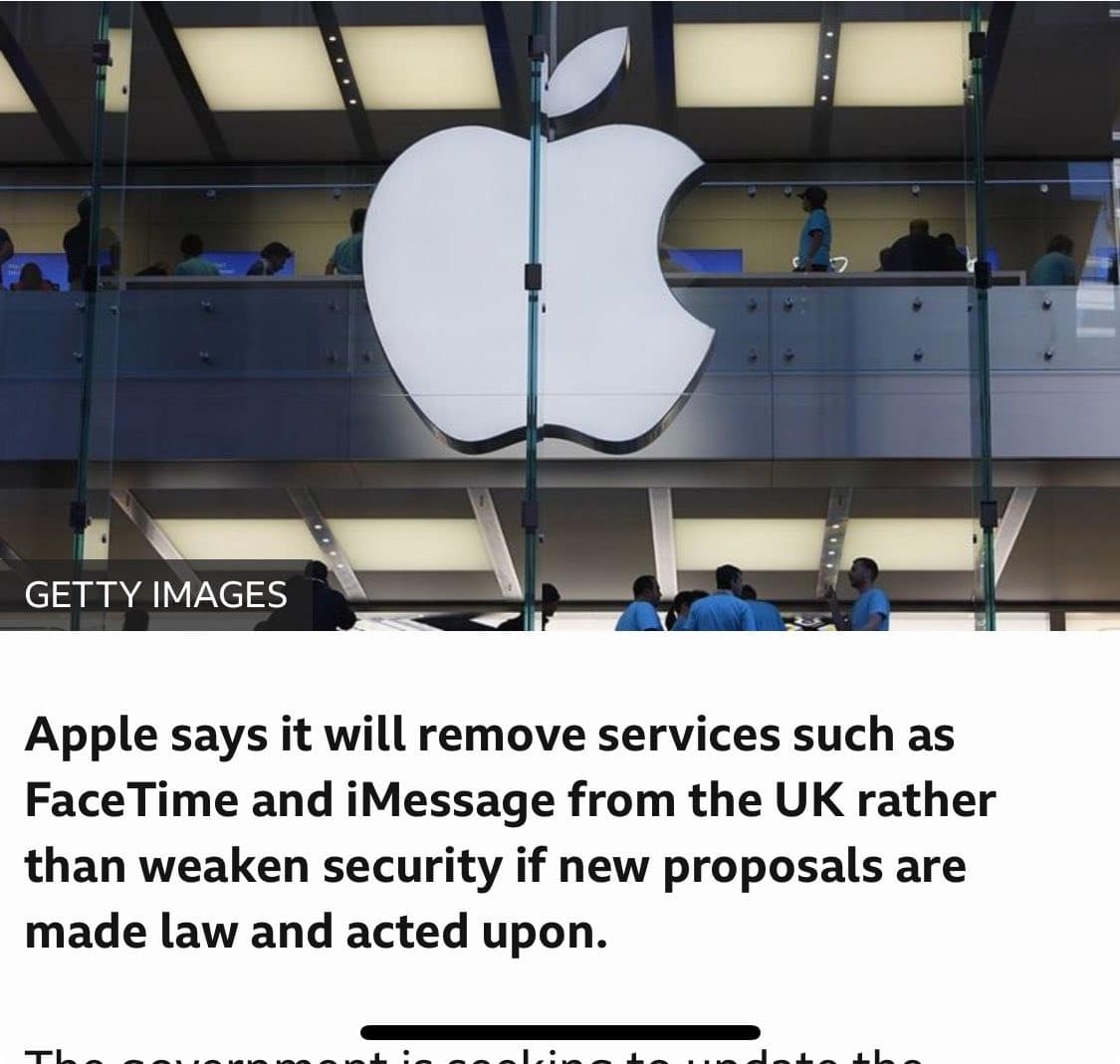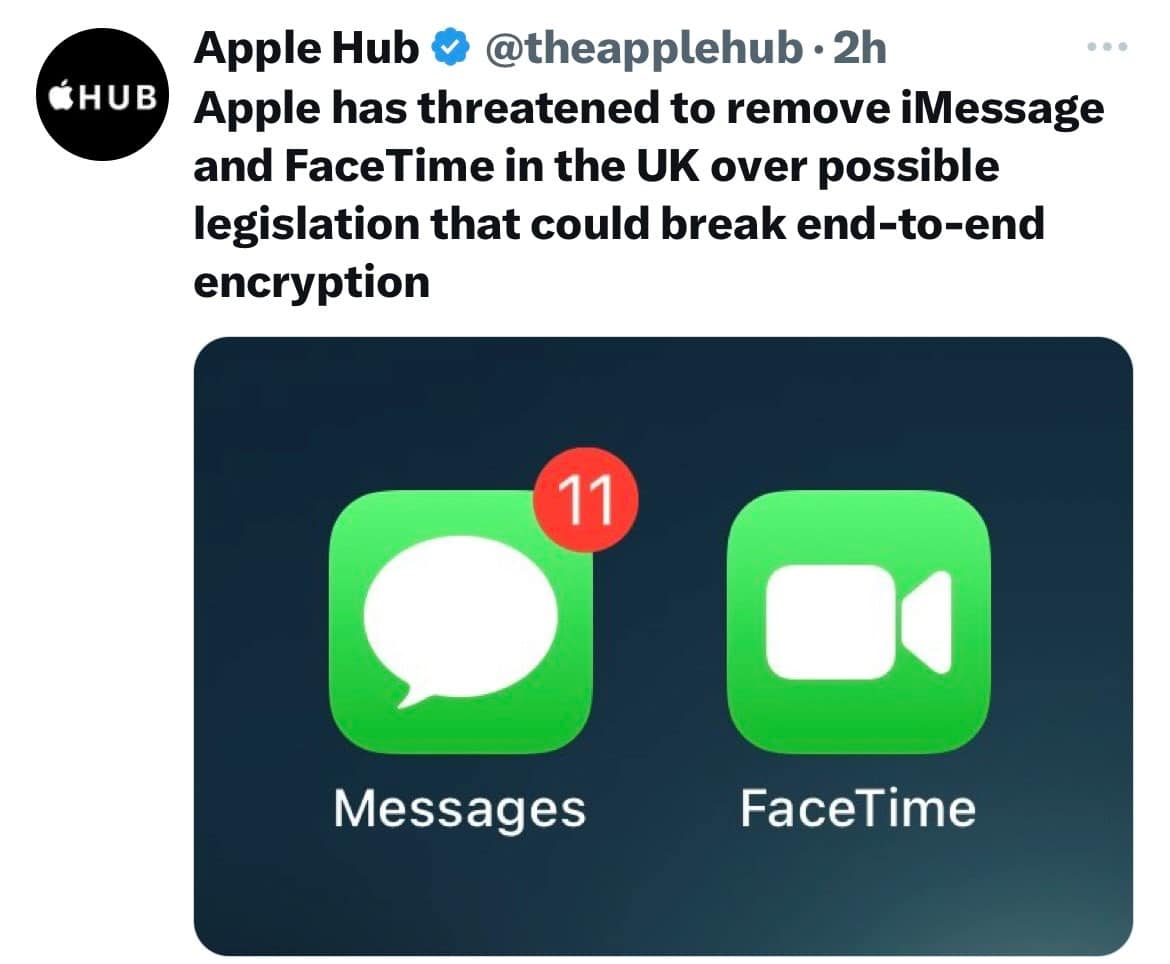HIGHLIGHTS
* The UK government is planning on introducing the ‘Online Safety Bill’, which will scan the content of messages for CSAM (child sexual abuse material) and other illegal content.
* The ‘Online Safety Bill’ wants to bring the ability to scan end-to-end encryption messages for child abuse and other content.
* In this context, Apple is likely to withdraw iMessage and FaceTime in the UK if the bill passes.
* Similar to WhatsApp and Signal, Apple now has opposed the Online Safety Bill.
* Apple says the proposal will constitute a serious and direct threat to data security and information privacy that will also affect people outside the UK.
The UK government is planning on introducing the ‘Online Safety Bill’, which will create regulations for messaging services and this includes Apple’s iMessage.
This will scan the content of messages for CSAM (child sexual abuse material) and other illegal content.
This bill also wants the ability to scan end-to-end encryption messages for child abuse and other content. In this context, Apple is likely to withdraw iMessage and FaceTime in the UK if the bill passes (via).
The UK government is currently planning to introduce the Online Safety Bill which will create regulations for messaging services, including Apple’s iMessage to scan the content of messages for CSAM (child sexual abuse material) and other illegal content.
The Online Safety Bill also wants the ability to scan end-to-end encryption messages for child abuse and other illegal content.

Previously, companies such as WhatsApp and Signal have opposed this upcoming proposal and had implied that they would withdraw their services. Now, Apple is the latest company which is likely to take a similar stand if the said bill passes.
Apple says that such laws would affect users’ security features, which will lead to the closure of Apple’s iMessage and FaceTime services in the UK.
Besides Apple, giants like WhatsApp and Signal have opposed this proposal and implied that they might withdraw the services.

Apple said that it would not make changes to its features/services just for one country.
The new ‘Online Security Bill’ will be a serious and direct threat to data security and information privacy which would affect people outside the UK.
Apple has requested the government to amend the bill to protect strong end-to-end encryption to benefit everyone.
The UK government, on the other hand, said that end-to-end encryption prevents authorises and the firm themselves from identifying any child abuse case.
The govt earlier mentioned that tech companies have a moral duty to ensure that they are not blinding themselves and law enforcement from child abuse on their platform.

The Online Safety Bill is currently under an eight-week consultation period. Apple and other companies are hoping that the government will revise the bill owing to criticism.
The reason for opposing is a clause in the bill that would allow communication regulators to require tech giants to install technology to scan for child abuse material in encrypted messaging apps and other services.
The head of WhatsApp, Will Cathcart back in March said that the company would be blocked in the UK rather than to weaken privacy.
Apple says it would remove iMessage and FaceTime in the UK rather than break end-to-end encryption
Facing possible legislation that would require messaging services to offer backdoors in end-to-end encryption, Apple is saying it would rather remove apps like iMessage and FaceTime entirely from the UK market (via BBC News).

The new Online Safety Bill is currently under review. Apple, WhatsApp, Signal, and other services have voiced their opposition to the proposal.
The UK government wants the ability to scan end-to-end encrypted messages, for child-abuse material and other illegal content. They argue the existing law accommodates this but is technically outdated by the security provisions of modern technology.
Apple has submitted a nine-page opposition to the planned bill. It strongly objects to requirements such as backdoors for end-to-end encryption, reporting changes to product security features before they are released and being forced to disable security features before an appeals process can take place.

The company said it would not make changes for one country that would weaken security for all of its users, threatening instead to disable iMessage and FaceTime for UK customers.
The proposed law is currently undergoing an eight-week consultation period.
Obviously, Apple and others hope the government will revise the bill in response to the criticism.
Apple previously withdrew plans for its own CSAM-scanning feature for iCloud Photos, following pushback from customers and human rights groups.
Apple’s solution was more privacy-preserving than what is now proposed by the UK government.
Faqs
1) Apple Said That It Will Withdraw iMessage And FaceTime If Online Safety Bill Passes.Details?
Ans) The Cupertino-based tech giant says that such laws would affect users’ security features which will ultimately lead to the closure of Apple’s iMessage and FaceTime services in the UK. Furthermore, Apple also has said that it would not make changes for one country which would affect the security features.
Additionally, the company says that it would require it to send software updates that could not be made secretly. The said proposal would constitute a serious and direct threat to data security and information privacy which would also affect people outside the UK. The company also has urged the government to amend the bill to protect strong end-to-end encryption for the benefit of all.
The UK government police on the other hand have said that the end-to-end encryption prevents authorises and the firm themselves from identifying child abuse material. The government had previously stated that tech companies have a moral duty to ensure that they are not blinding themselves and law enforcement to the unprecedented level of child abuse on their platform.
The Online Safety Bill is currently undergoing an eight-week consultation period. The companies such as Apple and others hope that the government will revise the bill considering the criticism. WhatsApp and Signal have also opposed a clause in the upcoming bill that would allow the communications regulator to require companies to install technology to scan for child abuse material in encrypted messaging apps and other services.
However, WhatsApp and Signal had already stated that they would not comply with it. Similar to Apple, Signal also has threatened to walk from the UK if the proposed bill passes. The head of WhatsApp, Will Cathcart also said in March that the company would rather be blocked in the UK than to weaken the privacy of the encrypted messages.
2) Do Roughly 20 million Britons use an iPhone?
Ans) Apple threatened to remove popular iOS features—including iMessage and Facetime—from British iPhone users after the UK government proposed sweeping new surveillance powers over mobile messaging services.
The UK government, helmed by Conservative Party Prime Minister Rishi Sunak, is looking to update the 2016 Investigatory Powers Act (IPA). The updates would give the Home Office to power to unilaterally review and disable privacy features in personal messaging apps to assist with national security and law enforcement.
Right now, the government needs to clear any decision to disable security features in messaging services with an independent oversight committee, giving tech companies the ability to appeal the decision.
Apple was not immediately available for comment. In a filing with the Home Office during an eight-week consolatory period, Apple sharply criticized the proposed law, saying that it had no intention of allowing the decisions of one country to weaken security features for all iOS users.
“[The proposals] make the Home Office the de facto global arbiter of what level of data security and encryption are permissible,” Apple wrote in its filing, according to a Guardian report. “Together, these provisions could be used to force a company like Apple… to publicly withdraw critical security features from the UK market, depriving UK users of these protections.”






